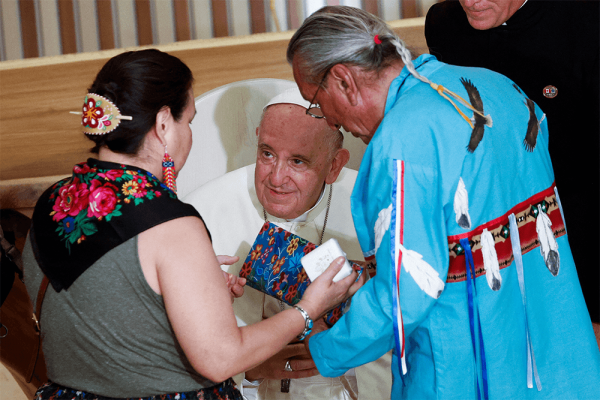Pope Francis’ July visit to the First Nations in Canada has rekindled conversations about the Catholic Church’s responsibility in blessing and legitimizing the colonization of Indigenous homelands.
Scholars and activists are still urging the Vatican to publicly revoke the 15th-century papal bulls that comprise the “Doctrine of Discovery,” though church officials claim it has already been repealed.
“I have no doubt that the pope feels bad about this history and that he wishes these things hadn’t happened. But anyone could have given the apology that he gave,” Mark Charles, a Navajo theologian and activist, told Sojourners. “He didn’t apologize as the leader of the Catholic Church. It was heartfelt but intended not to expose the Catholic Church to legal liability.”
The Doctrine of Discovery is part of what Charles said opens the church to liability. It was a set of aggressive instructions set forth by the Catholic Church, carried out to conquer, occupy, and control the non-Christian world and its peoples. It has been cited throughout legal cases in the U.S. and Canada.
Charles, co-author of Unsettling Truths: The Ongoing, Dehumanizing Legacy of the Doctrine of Discovery, told Sojourners the church must address its role in baptizing the colonial missions approved by European and American governments and broaden the scope of responsibility for atrocities committed beyond singling out bad actors within their religious institution.
The Doctrine of Discovery did not just influenced churches in justifying attempts to forcibly assimilate Native youth in residential schools, it also established legal theories and systemic forms of oppression in Canada and the United States.
Understanding the doctrine
The papal bulls — edicts from popes throughout history — that compose the Doctrine of Discovery primarily span from 1452 to 1493, and the legal uses of the doctrine by Western governments thereafter.
In 1452, Pope Nicholas V wrote the “Dum Diversas” to King Alfonso V of Portugal to force Muslims, “pagans and any other unbelievers” into perpetual slavery.
Three years later, the pope issued “Romanus Pontifex” in 1455, declaring war against all of the non-Christian nations and peoples across the globe. The church sanctioned and encouraged the conquest, colonization, and exploitation of non-Christians; the bull helped expand Portugal’s slave trade in Africa.
King Alfonso V was ordered to “invade, search out, capture, vanquish, and subdue all Saracens and pagans whatsoever, and other enemies of Christ,” and to take away all their possessions and property, both “movable and immovable.”
In 1493, Pope Alexander VI authored “Inter Caetera” a year after the voyage of Christopher Columbus, commissioned by the Catholic Church. That decree justified Spain’s seizure of lands in the name of Christian expansion and led to the Doctrine of Discovery becoming the basis of European land claims.
Once the European explorers settled and eventually claimed the New World as their own, they spread their Christian doctrine. It ultimately seeped into America’s founding and fledgling institutions of governance.
In 1823, the Supreme Court’s landmark ruling in Johnson v. M’Intosh established personal property rights through dispossession of Indigenous inhabitants on Turtle Island — the Native name given to the continent of North America through the creation stories.
“Discovery is the foundation of title, in European nations, and this overlooks all proprietary rights in the natives,” Chief Justice John Marshall wrote in the court’s unanimous opinion.
Philip Arnold, associate professor and chair of the Department of Religion at Syracuse University, oversees the Doctrine of Discovery Project, a partnership with the Indigenous Values Initiative and American Indian Law Alliance, with support from the Onondaga Nation. It’s an open-access educational resource that illuminates the doctrine’s religious roots and present impact on Indian Country.
“There are a variety of these papal documents that legitimize, encourage, and even fire the imagination of these discoverers that they’re doing God’s work in the world by going out and conquering lands,” Arnold said.
Adam DJ Brett, a historian of American religion who works with the Doctrine of Discovery Project, pointed out that the 1823 case was cited by one of the most liberal justices on the Supreme Court. The late Ruth Bader Ginsburg, cited Johnson v. M’Intosh in the City of Sherrill v. Oneida Indian Nation of New York case, better known as the Sherrill decision, in 2005.
“When we see the most recent Supreme Court cases, we again see a privileging of a particular type of Christianity,” Brett said.
Rescinding the doctrine
Sustained pleas in pressuring the Vatican to rescind the papal bulls can be traced back three decades prior to Pope Francis’ July trip to Canada.
The Indigenous Law Institute, supervised by co-founder and director Steven Newcomb, initiated an appeal to repeal the Inter Caetera during the reign of Pope John Paul II in 1992.
A year later, the Declaration of Vision was drafted by 60 Indigenous delegates at the 1993 Parliament of World’s Religions, which convened in Chicago.
In 2010, the Permanent Observer Mission of the Holy See Celestino Migliore commented on the Doctrine of Discovery during the U.N. Ninth Session of the Permanent Forum on Indigenous Issues, saying the Inter Caetera is “a historic remnant with no judicial, moral or doctrinal value” for the purpose of international or Catholic Church law.
He said the Doctrine of Discovery juridical precedent is “a characteristic of the laws of those states” and that any refutation of this doctrine falls “now under the competence of national authorities, legislators, lawyers, and legal historians.”
The 1493 papal bull has already been “abrogated,” Migliore claimed, pledging the Catholic Church “will continue to be an outspoken moral voice in support of the dignity and rights of Indigenous peoples.”
Indigenous leaders, once again, returned to the Vatican, this time, to meet with Pope Francis six years later. Cardinal Silvano Tomasi, chair of the Pontifical Council for Justice and Peace, said the papal bulls were no longer in effect, but later agreed to reconsider the issue.
A delegation of representatives from the Haudenosaunee Confederacy, Canada’s Truth and Reconciliation Commission, and the Yakama Nation requested a full retraction of the papal bulls in 2018.
Other faith groups have condemned their roles in complicitly upholding the Doctrine of Discovery, including the Presbyterian Church (U.S.A.), American Friends Service Committee, and the World Council of Churches.
In July, Don Bolen, the archbishop of Regina, Canada, said the papal bulls have been “off the record” since 1537, but that “it would be very good if the pope could make this even clearer.”
The Canadian Conference of Catholic Bishops (CCCB) has been asking the Vatican to issue an official statement explicitly naming the Doctrine of Discovery in the last few months following the pope’s official trip.
“We have heard a strong desire from Indigenous Peoples for the Vatican to name these texts, acknowledge their impact and renounce the concepts associated with them,” Jonathan Lesarge, CCCB’s government and public relations advisor, wrote to Sojourners.
The CCCB continues to work with the Vatican and the U.S. Conference of Catholic Bishops on a statement regarding the doctrine in “the coming weeks,” according to Lesarge.
Newcomb, a Shawnee and Lenape author of Pagans in the Promised Land: Decoding the Doctrine of Christian Discovery and co-producer of a documentary film on the same subject, has spent four decades studying the papal bulls and calling for their official revocation.
But he argues derailing the ideology won’t be immediate and nearly impossible — even if the Catholic Church were willing to rescind. Western civilizations have been erected upon that series of religious edicts that impose “dominion,” or a “Doctrine of Domination,” he told Sojourners.
“What the papal bulls do is they provide us with information that helps us understand the overall patterns and premises that were put forward all those centuries ago, that resulted in the current global order,” Newcomb said.
Kaitlin Curtice, an enrolled member of the Citizen Potawotami Nation, said the Catholic Church “must take responsibility for its role in colonization, forced assimilation, and genocide” by revoking the Doctrine of Discovery.
“I think it’s a start, but a lot more needs to be done,” Curtice told Sojourners. “In Canada there is still ongoing colonization today, and the Pope needs to acknowledge that, acknowledge complicity, and begin doing the hard work of supporting Indigenous people moving forward.”
Indigenous intellectuals say the continuing apologies couldn’t go any further partly because of the implications at stake for the Catholic Church and its trove of land holdings across Europe and the Americas.
Today, one estimate says the Catholic Church owns 177 million acres of land around the globe. And a first-ever publicly released real estate holdings disclosure, reveals the Vatican city-state possesses more than 5,000 properties — a fifth of all sites are located outside of Italy.
Curtice looks at gifting land back to Indigenous communities as a tool to actualize restorative justice after centuries of wrongdoing on the Church’s part. Still, she remains skeptical of its prospects, given the systems that Indigenous peoples are fighting within — courtrooms and governing institutions that built the law off the Doctrine of Discovery.
“The global Land Back movement is a commitment to decolonization, a true commitment to listening to Indigenous peoples all over the world and to Mother Earth herself,” Curtice said. “Is the Catholic Church really willing to do that after acknowledging everything that the Doctrine of Discovery has taken from us?”
Got something to say about what you're reading? We value your feedback!






